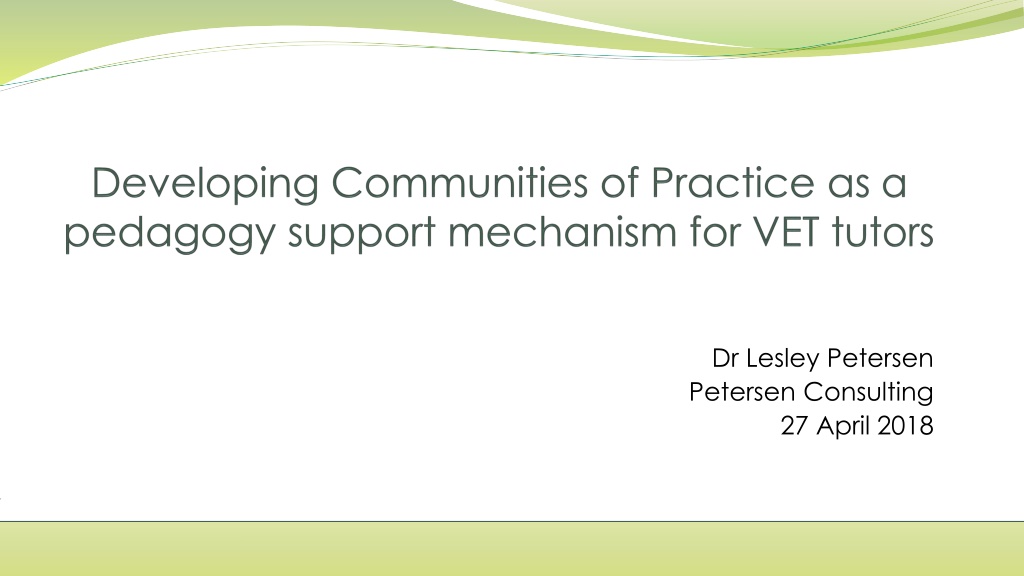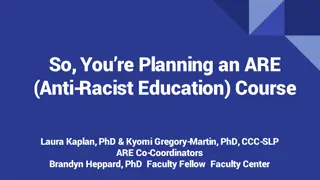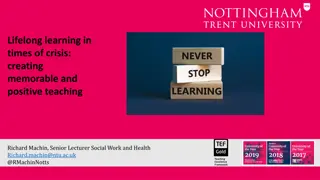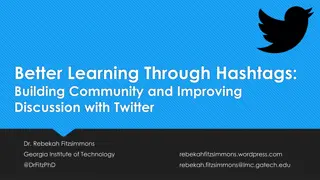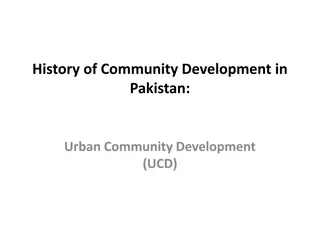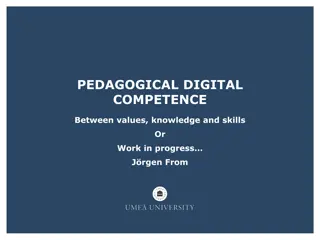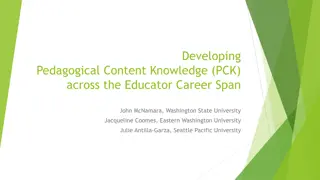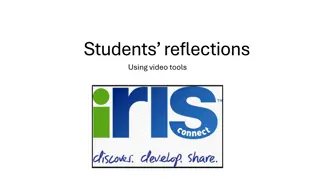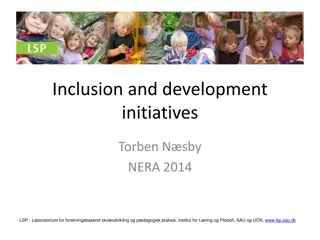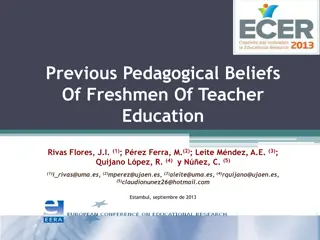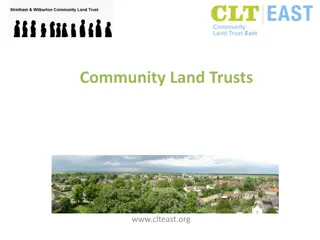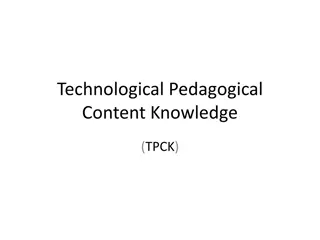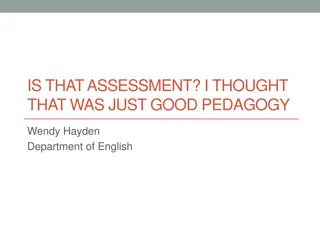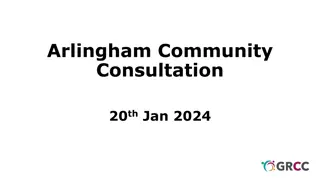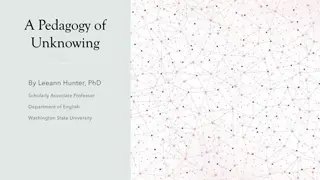Enhancing Pedagogical Development Through Community of Practice
The research project led by Dr. Lesley Petersen of Petersen Consulting focuses on investigating the effectiveness of a Community of Practice (CoP) in developing pedagogical practices of foundation education tutors in the VET context. Utilizing participative action research and peer mentoring partnerships, the project aims to create a unique CoP model that reflects the practices of these tutors. CoP meetings, reflective journaling, and peer mentoring activities have been instrumental in enhancing the tutors' teaching approaches and fostering a culture of continuous professional development.
Download Presentation

Please find below an Image/Link to download the presentation.
The content on the website is provided AS IS for your information and personal use only. It may not be sold, licensed, or shared on other websites without obtaining consent from the author. Download presentation by click this link. If you encounter any issues during the download, it is possible that the publisher has removed the file from their server.
E N D
Presentation Transcript
Dr Lesley Petersen Petersen Consulting 27 April 2018
The research project Central Purpose: A collaborative project investigating the effectiveness of a Community of Practice (CoP) as a mechanism for pedagogical development of foundation education tutors in the VET context Aims: 1. Investigate how a CoP can provide a space for tutors to develop their pedagogical practice 2. Determine the impact of peer mentoring partnerships as an additional support mechanism for tutor reflection and relationships 3. Develop a CoP model that reflects the unique practices of foundation tutors in the VET context
The research project Built on an earlier project: Signature pedagogies - investigated how tutors understanding of their practice can influence effective teaching and contribute positively to student learning experiences and outcomes. Methodology: Participative action research Blended approach online and face to face meetings Reflective journaling Peer mentoring Participants: 15 foundation education tutors across three VET organisations Project researcher as CoP coordinator and facilitator
What we did CoP training workshop 4 monthly, two-hour CoP meetings: i) Exploring tutors pedagogical practices; ii) Sharing of teaching and learning experiences; iii) Seeking solutions to teaching and learning challenges; iv) Identifying goals for the tutors ongoing professional development Time between CoP meetings: i) Tutors engaged in peer mentoring partnerships ii) Tutors trialled and/or implemented strategies which support student achievement iv) Built teaching & learning resource repository
Data sources Evaluation summaries of the training workshop Transcribed minutes of CoP meetings Mid-point online survey Summative 1-1 interviews at conclusion of project period
What do you think influences the success of a Community of Practice?
What we found Commencing the project with a training workshop provided the tutors with an opportunity to explore the concept and practice of CoPs and determine the purpose of their CoP going forward The monthly CoP meetings provided a place and space for the tutors to share their teaching experiences, discuss and seek solutions to teaching and learning challenges, and learn from each other The CoP prompted the tutors to engage in critical reflection on and in their practice
What we found All tutors felt that they had benefitted significantly from their experience as members of an active CoP and were keen to continue Leadership of the CoP should be distributed with members taking turns to assume the coordinator role (this did not occur in the project) The importance of a designated facilitator, at least in the early stages of a newly established CoP Peer mentoring partnerships encouraged ongoing reflection and investigation into teaching practice, built collegial relationships, developed trust in the peer partnership and within the CoP group
The feedback I am recognising how my teaching style influences the students learning I am using more innovative teaching and learning strategies which I am confident and comfortable with More structure, more activities in the meetings would be good, e.g. identify a problem and everyone chips in with possible solutions People need to attend the initial training workshop, so they know what to expect and how to participate This is a real opportunity for teacher development. You can discuss specific student issues in a safe environment An opportunity to step out of the organisation for a time but still be with like-minded people
Challenges Limited/no online accessibility for some original participants Connectivity variable in CoP meetings, impacting on sense of flow, continuity, ease and flow of dialogue Members dropped out at various points over the project time-frame, which naturally had an influence as the group dynamic consequently changed.
Project outcomes and outputs Tutors interested in continuing to participate in a CoP Positive, lasting connections made across the 3 organisations Increase in internal capability Cohesive teams forming (outside the CoP) Vehicle for identifying professional development needs CoP model confirmed Design of a CoP Implementation Guideline which reflects the VET context and which can be applied across different education sectors CoP training workbook Peer mentoring guidelines and training workbook Reflective journal resource
CoP Model Bi-monthly meetings Peer mentoring between meetings Shared facilitation role Key Topic sessions including: Teaching & learning approach Session plan exemplar Teaching session Invited speakers
Next steps Tutors CoP initiative has continued - six-weekly meetings More CoPs being established for other organisational teams New research project commencing to continue building on this project One year programme of staff professional development: Peer observation Manager observation Adult teaching workshops Teacher capability matrix Team building workshop Appreciative Inquiry Strategic decision-making workshops for managers
